Scottish independence: Thousands on the streets for weekend campaign
- Published
- comments
James Cook speaks to both sides on the final weekend of campaigning
Thousands of supporters of both sides in the Scottish referendum debate took to the streets on the final weekend before the vote.
The pro-independence Yes Scotland campaign had said Saturday would be the "biggest day of national campaigning" Scotland has ever seen.
The Better Together campaign claimed there would be "a thousand events all across Scotland today".
Supporters of both sides argued that the momentum was with them.
The latest poll of polls collating the the six most recent surveys - carried out between 9 and 12 September and excluding "don't knows" - puts the No campaign on 51% and the Yes campaign on 49%.
And a new Sunday Times poll - conducted by Panelbase - puts the No campaign on 50.6% and the Yes campaign on 49.4%.
That is a narrowing of the gap compared with the paper's poll for last weekend, which showed a No campaign lead of 52% to 48%.
'Momentum growing'
Saturday's campaigning followed interventions in the debate by businesses raising concerns about independence, which "Yes" campaigners claimed was "orchestrated" by the UK government.
Scotland's Deputy First Minister, Nicola Sturgeon, said: "The 'Yes' campaign has been carried along by a flourishing of self-confidence among people in Scotland.
"That momentum is still growing and will soon become unstoppable, as people reject the Downing Street-orchestrated campaign to talk Scotland down.
"Today thousands of Yes supporters from communities across Scotland will be running the biggest campaign day of action Scotland's ever seen."

On the Yes campaign trail
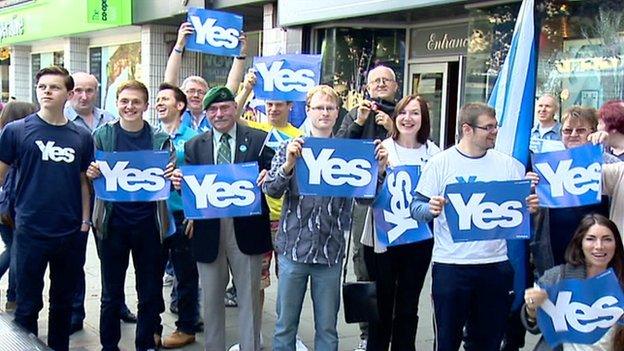
Yes campaigners took to the streets in Glasgow
By James Cook, BBC News Scotland correspondent
Scotland today is a nation frantic with political activity and campaigners for independence, for so long the underdogs in this debate, are relishing the energy.
Every time he stepped from a car or a helicopter, Alex Salmond was surrounded by supporters.
On Prestwick high street in Ayrshire this morning, the first minister rallied the troops before popping in to the local Wetherspoons for a swift half.
The choice was not accidental. The boss of the pub chain, Tim Martin, has been a voice of support for independence saying "Scotland could do very well on its own".
Other businesses have taken a very different view with talk of economic disaster if there is a "Yes" vote.
But travelling by helicopter from town to town, Mr Salmond seemed remarkably relaxed about such interventions.
He thinks he has caught the mood of the public, insisting they don't want to hear tales of doom and gloom.

Better Together published a new poll on Saturday suggesting 53.5% opposed independence and 46.5% backed it, when undecided voters were excluded.
The telephone poll, commissioned by Better Together from pollsters Survation, reached 1,044 respondents, with an effective sample size of 927.
Conducted between 10 and 12 September, it used a different methodology from previous Survation polls.
Better Together campaign director Blair McDougall said: "This poll suggests that 'No' are in the lead but that the race is far from over.
"No-one can afford a protest vote. Any one of us could cast the vote that makes the difference between the UK staying together or breaking apart."
Labour MP Jim Murphy, for Better Together, added: "I get a sense now the momentum has switched back - huge numbers of undecided voters are coming to us, there's a thousand events all across Scotland today."
Responding to the poll, a Yes Scotland spokesperson said: "There is everything to play for, and this will spur on everybody who wants and is working hard for a 'Yes' to redouble their efforts.
"A 'Yes' vote is our one opportunity to achieve job-creating powers, protect our NHS from the damaging impact of Westminster privatisation and cuts, and ensure that never again do we get Tory governments imposed on Scotland that we have roundly rejected."

On the No campaign trail
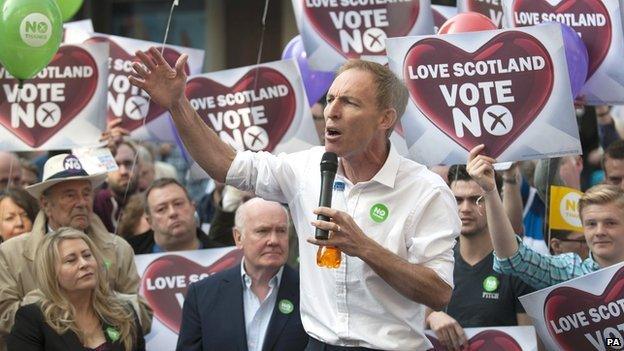
Labour's Jim Murphy was campaigning with "No" supporters
By Iain Watson, BBC News political correspondent
Thousands of members of the Protestant Orange Order marched through the streets of Edinburgh in defence of the union.
Better Together, the official No campaign, kept its distance - it wanted to maintain support from people of all faiths and none.
Across the River Forth in Fife, former prime minister Gordon Brown spoke at a community centre on a council estate in Kirkcaldy - the town where he grew up.
He listed what he saw as the risks of a "Yes" vote - from higher prices to businesses moving south.
And following Deutsche Bank's warning that independence could lead to a new depression, he said if an independent Scotland were to fail to pay its fair share of the UK national debt, it could face an era of hyper-inflation and economic meltdown similar to Weimar Germany between the wars.

Yes Scotland said over the weekend there will be more than 35,000 volunteers at 473 registered street stalls trying to persuade people to vote for independence.
They said that 2.6 million "Yes" leaflets would be delivered in 48 hours.
Meanwhile, the bosses of three retail groups have put their names to a letter in the Daily Record, external, in which they claimed their costs would rise in an independent Scotland and they would have to take "the difficult decision" whether or not to pass those on to consumers.
The letter, signed by the heads of Marks and Spencer, B&Q owner Kingfisher and Timpsons, read: "Within our group there is first-hand experience of trading across national borders - in France, Ireland and across the world.
"Our experience is that it always leads to more red tape and higher costs."
In a separate open letter the heads of several telecommunications groups said they would have to modify their networks, possibly incurring increased costs if Scotland voted for independence.
However, Mohammed Ramzan, the chairman of cash and carry business United Wholesale Grocers and a "Yes" supporter, said: "Every single company fights for market share - they can't afford to raise prices because they have to compete to retain their market share and to grow."

Elsewhere on the campaign trail:
Alex Salmond has said a "Yes" vote would lead to "a day of celebration". He was speaking after former SNP deputy leader Jim Sillars suggested there could be "a day of reckoning" for businesses who spoke out against independence. Mr Sillars later said: "I knew when I used terms like 'reckoning' and 'nationalisation' that I would get exposed both on radio and television."
Mr Salmond has been continuing his helicopter tour of the country, including stops in Oban, Dumfries, Ayr and Glasgow.
Gordon Brown, speaking in Kirkcaldy, said the "No" campaign had "a patriotic vision for the future". He added: "None of us here should allow it to be said that anybody who votes 'No' is less patriotic and less proud of our country."
Gordon Brown's predecessor as Labour prime minister, Tony Blair, has given his backing for the Union. During an interview in Kiev, he said to "rip up the alliance" between Scotland and the rest of the UK would not be sensible "politically, economically or even emotionally".
Orange Order members staged a pro-Union rally in Edinburgh. Police said 15,000 participants, 110 Orange lodge bands and several thousand spectators took part. Grand Master Edward Stevenson said it was "an enormous celebration and an awesome expression of our pride in our United Kingdom".

Police complaint
Mr Salmond has renewed his complaint that the Treasury broke ministerial rules when it confirmed to journalists that the Royal Bank of Scotland (RBS) planned to relocate its registered headquarters from Edinburgh to London in the event of a "Yes" vote.
He has written to Sir Jeremy Heywood, the UK's most senior civil servant, asking "which minister or official authorised the release [of the information about RBS]" and "at what time the information was released".
BBC economics editor Robert Peston said he had been told the Treasury briefed journalists about the plans to potentially move to London before the board of RBS had formally approved the decision.
But he said sources had told him they did not believe it was a case of market abuse, or the illegal release of price sensitive information, because the UK and US stock markets were shut at the time of the briefing.
Police Scotland have confirmed they have received a complaint from RBS shareholder Peter de Vink, a supporter of independence for Scotland, alleging the UK government leaked market-sensitive information about the bank.
Mr de Vink said Downing Street "has been behaving like a dictator in a banana republic," adding that the UK government's behaviour was "a total affront to democracy".
He said he had written to Scotland's senior prosecutor, the Lord Advocate as well as Police Scotland, the City of London Police and the Financial Conduct Authority.

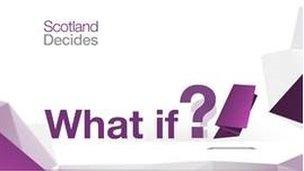
A referendum on whether Scotland should become independent is to take place
People resident in Scotland will be able to take part in the vote, answering the "Yes/No" question: "Should Scotland be an independent country?"
The referendum will take place on Thursday, 18 September 2014
Go to the BBC's Scotland Decides page for analysis, background and explainers on the independence debate.

Great Depression
In other developments, Deutsche Bank's Mr Folkerts-Landau said it was "incomprehensible" that Scotland was even contemplating withdrawal from the UK.
The chief economist compared a potential "Yes" vote to the mistakes which led to the Great Depression of the 1930s.
"A 'Yes' vote for Scottish independence on Thursday would go down in history as a political and economic mistake as large as Winston Churchill's decision in 1925 to return the pound to the Gold Standard or the failure of the Federal Reserve to provide sufficient liquidity to the US banking system, which we now know brought on the Great Depression in the US," he said.
Deutsche Bank global strategist Bilal Hafeez said an independent Scotland would no longer have the Bank of England as a lender of last resort
Deutsche Bank's global strategist Bilal Hafeez also said independence would bring a depression to Scotland and possibly the rest of the UK.
He told Radio 4's Today it was "very, very difficult" to make a case for Scotland flourishing as an independent country.
"Essentially the issue is that if Scotland was to break away from the Union, but retain the pound... Scotland would lose control of the pound, it would have to accept whatever monetary policy was set for the rest of the UK. It would not have control of the money supply in the country.
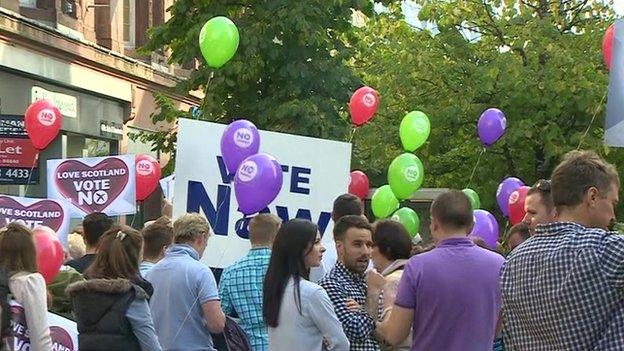
The Better Together campaign said there were unanswered questions about independence
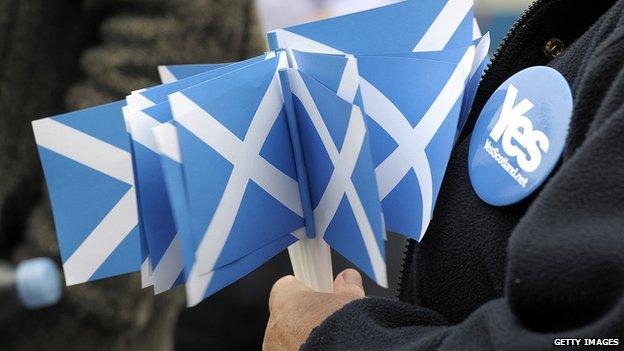
The "Yes" campaign said it was holding the "biggest day of national campaigning" Scotland has ever seen
"More importantly, it wouldn't have a central bank that can issue pounds - that power would reside with the Bank of England."
However, the Scottish government accused Mr Folkerts-Landau of failing to take into account Scotland's "strong fiscal position".
And a former managing director of Deutsche Bank Scotland, Ian Blackford, dismissed the warning as "scaremongering".
Mr Blackford, a former SNP treasurer, said: "They're talking about really an economic tsunami that could affect Scotland if we vote for independence on the basis of the financial risk for the banks.
"But you know this has been superseded because the banks themselves have said that they will move their registered offices under certain circumstances to London so they will have the protection of the lender of last resort from the Bank of England, that doesn't change.
"So I would look upon this as scaremongering really of the worst order."
Media mogul Rupert Murdoch is in Scotland and tweeted, external: "Cameron and Brown have promised so much more devolution if No wins, Britain will look like a federation. Bet many Tories outraged."
He added: "Unprecedented 97 per cent registered. Everywhere alive with debate. Democracy truly at work. Both sides predicting victory."
On Thursday voters in Scotland will go to the polls to answer the Yes/No question: "Should Scotland be an independent country?"